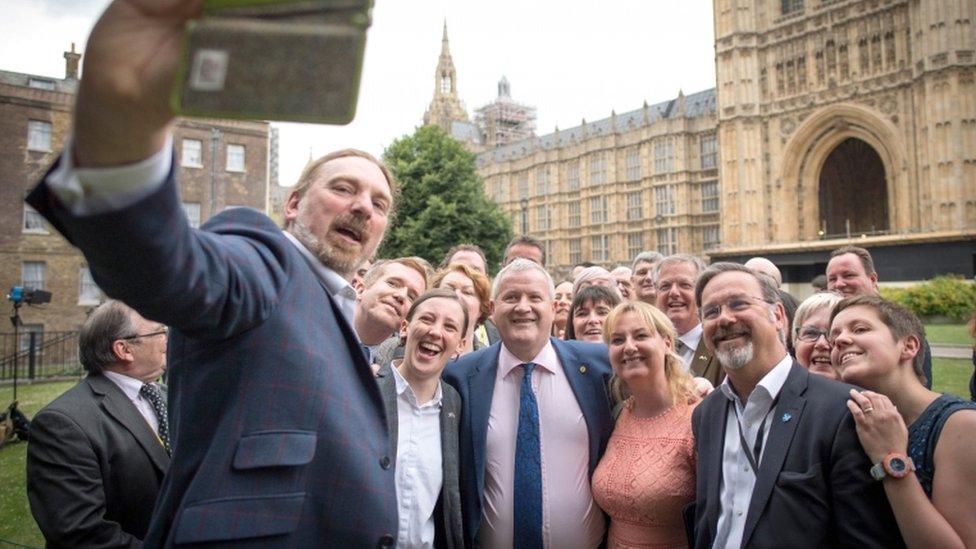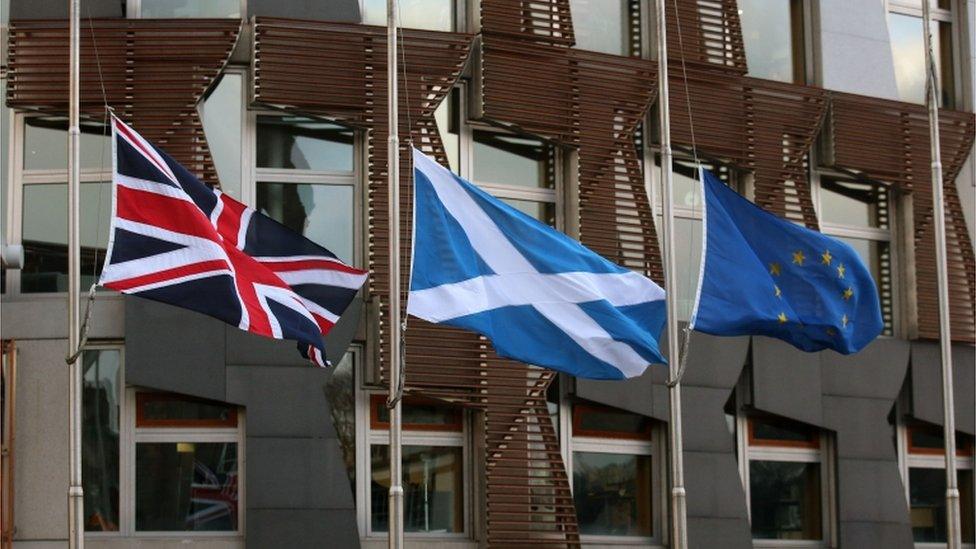Emergency debate on Brexit powers held in Commons
- Published

Lord Sewel suggested that parties were using the row to "seek political advantage"
An emergency debate has been held at Westminster on how repatriated powers should be dealt with after Brexit.
SNP MPs said the Sewel convention, which underpins the devolution settlement, is now unworkable.
The party's Westminster leader Ian Blackford accused the Conservatives of stabbing Scotland in the back with Brexit legislation.
But Cabinet Office Minister David Lidington said people want the UK's governments to work together.
He told MPs the government was adhering to the principles of devolution by pushing ahead with the withdrawal bill, despite Holyrood refusing its backing.
Mr Lidington said the package was a compromise and balanced.
Lord Sewel
Earlier Lord Sewel, one of the authors of the devolution settlement, has backed the UK government's view.
Under the Sewel convention, Westminster does not normally legislate on devolved matters without Holyrood's approval.
After MPs moved to do this with the EU Withdrawal Bill, Nicola Surgeon said the convention had been "ripped up".
Lord Sewel said the "size and scale" of Brexit as an issue meant Westminster must be able to act "on initiative".
And he said the situation was "not a constitutional crisis", suggesting that some parties were using the row to "seek political advantage".
Last week, MSPs voted by a margin of 93 to 30 not to give Holyrood's consent to the EU Withdrawal Bill following a row over how powers currently exercised from Brussels would be used after Brexit.
MPs opted to proceed with the bill, although only minutes were available for discussion of devolved powers during the final debate in the Commons - prompting SNP MPs to walk out of the House of Commons in protest during Prime Minister's Questions the following day.
First Minister Nicola Sturgeon said the Sewel convention had been "ripped up" by the UK government, saying Scotland had been "treated with utter contempt".
She said: "Our interests have been ignored, the voice and views of the Scottish Parliament have been completely cast aside, and I don't think it will be quickly or easily forgotten."
SNP MPs walked out of the Commons in a row with the Speaker
However, Lord Sewel himself has said that the "major constitutional adjustment" of Brexit could be justification for the UK government to "act on its own initiative", without securing devolved consent.
Formerly an Aberdeen district councillor and president of the Convention of Scottish Local Authorities, John Sewel was a member of the Scottish Constitutional Convention before becoming a Labour life peer in 1996. He served as a Scotland Office minister under Tony Blair at the time the Scottish Parliament was being set up.
He helped pilot the Scotland Act through the parliament, and his name was given to the "Sewel convention" - that Westminster would not normally legislate on devolved matters without consent.
'A class of its own'
Lord Sewel told BBC Scotland that nobody had foreseen anything like Brexit at the time the convention was drafted.
He said: "There is that 'not normally' phrase in the convention which does I think clearly recognise the possibility that something quite out of the ordinary would happen, which would mean the UK parliament would be required to legislate in a devolved matter even without the permission of the Scottish Parliament.
"I think we're all pretty well agreed that Brexit and leaving the EU is a major constitutional adjustment. We don't live in normal times, in other words.
"Both sides can have an argument on this. But I would tend to fall back on the one that the size and the scale of the change that's envisaged and being brought about because of Brexit does put it in a class of its own, and requires the possibility that the UK government would act on its own initiative, without necessarily the approval of the Scottish government."

Ian Blackford - pictured with SNP MPs after their walkout - called for emergency legislation to settle the row
Despite months of negotiations, Scottish and UK ministers have been unable to come to an agreement over how to set up joint frameworks of rules and regulations after Brexit, using powers currently held in Brussels.
Scottish ministers claim Holyrood is the victim of a "power grab", while their Whitehall counterparts say the Scottish government is seeking a "veto" over UK-wide rules.
Scottish Brexit minister Mike Russell said Lord Sewel's point about Brexit being a "major constitutional adjustment" made it "even more important" that the rules "protecting the Scottish Parliament's powers" were followed.
During Monday's debate, the SNP's Westminster leader Ian Blackford told MPs that the Sewel convention was now "unworkable", adding that what was "not normal" was the "attack on devolution" by the UK government.
He said the Conservatives had "stabbed the Scottish parliament and the Scottish people in the back", accusing the UK government of being "anti-Scotland" and calling for the Scottish Secretary David Mundell to quit.
Mr Blackford said the UK government should table emergency legislation to "end the power grab" and "resolve this constitutional crisis".
'Not a crisis'
A UK government spokesman said Lord Sewel had confirmed that it was proceeding "entirely in line with the devolution settlement", saying "both we, the Scottish government and now Lord Sewel acknowledge that these are not normal times".
Mr Mundell has also said the that UK government "followed the spirit and letter of the devolution settlement at every stage".
He said: "This is not a situation any of us would have chosen. It is not however a crisis, nor is it unforeseen.
"Whilst the devolution settlements did not predict EU exit, they did explicitly provide that in situations of disagreement the UK parliament may be required to legislate without the consent of the devolved legislature."
Mr Mundell also noted that the bill had been changed from its original form, to reflect a deal with the Welsh government to secure the consent of the parliament there.

Lord Sewel said he did not think the move could "fairly be described as a power grab", because the Scotland Act states "quite explicitly that it doesn't affect the power of the UK parliament to make laws for Scotland".
While he conceded that "the Scottish government has got an argument" in that many of the powers concerned lie in devolved areas like agriculture and the environment, he said it was not a case of the UK government bidding to "somehow remove" responsibilities from Holyrood.
The life peer - who resigned from the House of Lords in 2015 after being filmed allegedly taking drugs - said the convention bearing his name has "worked well" up until now.
He added: "You get a major crisis, of course - and Brexit is a major crisis - and these things get stretched to their limits. But it's also worth remembering that it is just a convention.
"It is not unknown for political parties to seek political advantage over these sort of issues, and there's a fair bit of that going on. It's not a constitutional crisis."